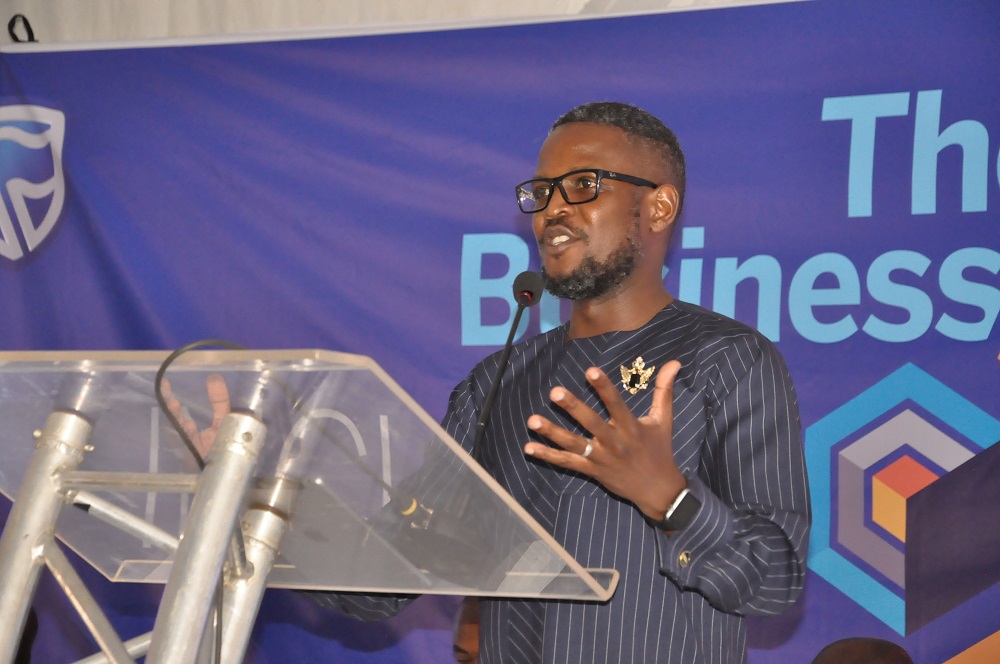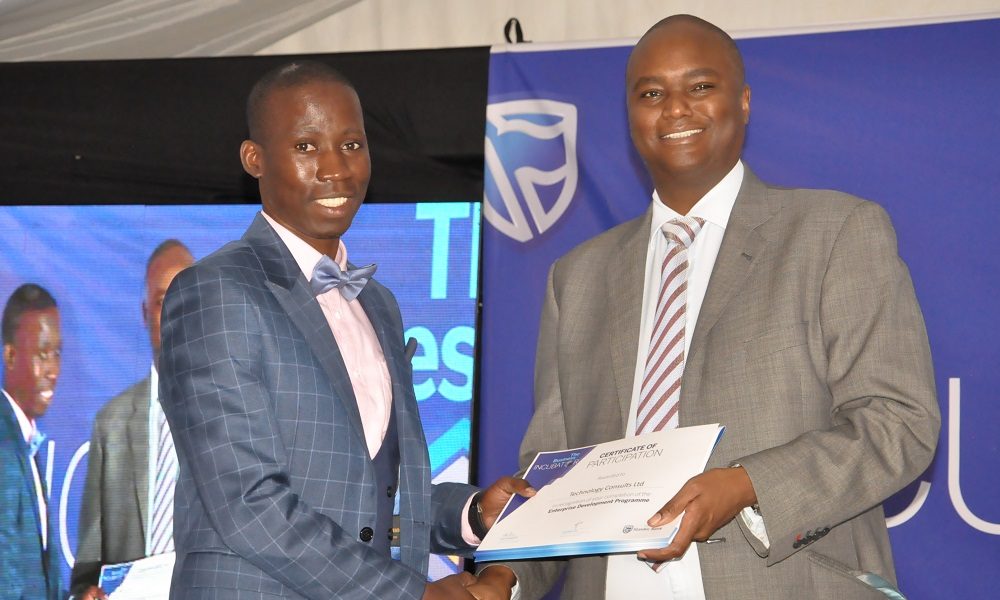Stanbic Bank Uganda, yesterday, August 09th, 2019 awarded 548 entrepreneurs from 122 Small and Medium Enterprises (SMEs) certificates, for having completed business training and courses at the Business incubator.
This is the third cohort of businesses that the incubator has churned out since its inception in February 2018.
In the first cohort, 94 individuals from 34 SMES completed the entrepreneurship training and this increased to 420 entrepreneurs from 119 SMES. With the third cohort, the total number of individuals benefitting from the training, comes to 1,062 and 275 SMEs.
Speaking during the graduation ceremony, Stanbic Bank’s Head of Enterprise Development Tony Otoa said, “We have continued to register an increase in number of entrepreneurs and SMEs taking advantage of this programme. Today we have graduated 548 entrepreneurs from 122 SMEs who have gone through different training sessions ranging from contracting, risk and insurance, Bid Management, Procurement and Negotiation, Quality Management, Procurement and Negotiation, Branding & Image Building among others.”

“Statistics from the past graduates demonstrate real productivity and revenue gains made by businesses that have completed the incubator training. 62% of companies showed positive growth through expansion into new markets and have taken on new employees. This demonstrates the continued growth we hope to for SMEs across the country,” he said.
Stanbic Bank Chief Executive Patrick Mweheire congratulated the graduates and reiterated that SME’s are the key engine of growth for Uganda’s economy with an employment capacity of over 2.5 million people, significantly higher than the corporate private sector at approximately 800,000.
“You simply cannot grow Uganda without growing the SME’s. Which is why we established a Business Incubator that provides capacity development programmes for entrepreneurs in SME’s. It trains and provides them with soft and hard skills necessary to improve their business operations and compete more effectively in the market place. It also deliberately prepares them to leverage the upcoming opportunities in Uganda’s emerging Oil and Gas sector,” he said.
Adding, “Over the last 18 months, the incubator has run three successful cohorts and a total of 1,062 entrepreneurs from 300 SME’s have been successfully trained and graduated from the incubator. I am happy to report that in the next few weeks, we shall be launching regional incubator centres in Mbarara, Mbale and Gulu in order to avail similar training and development opportunities to SME’s upcountry. We do this at absolutely no cost to the SME’s and more importantly – you do not have to be a Stanbic client to apply and participate.”

He encouraged the businesses not to relax but to strive hard. “Following this training session, our biggest hope is that the practical skills you have attained will do the same to boost your business growth, make it more effective and competitive in the market.”
“As you move forward in your growth journey, I encourage you to focus on continuously raising the bar in your business and supporting each other through collective sector based mentorship. There are a number of specific sector issues that can only be overcome by working and sharing collectively.” he concluded.
Stanbic Business Incubator in UGX 400 million partnership with GIZ
The immense success of the incubator programme has attracted an €100,000 euros (about UGX 400 million) grant from GIZ Employment and Skills for Eastern Africa (E4D/SOGA), a programme jointly funded by the British, Norwegian and German governments, to facilitate regional expansion of the SME business trainings across the country.
Through the partnership with the E4D/SOGA programme, the business incubator will be able to scale up skilling of SMEs in Uganda.
Donald Agaba, Deputy Team Leader for the E4D/SOGA programme said E4D/SOGA was “pleased to be partnering with the Stanbic Incubator” as the incubator had “brought much-needed business development services to Ugandan enterprises and is filling a large gap in the enterprise development landscape.”
“The programme aligns with the E4D/SOGA initiative’s objective of promoting local employment through capacity development of both Ugandan enterprises and people, particularly to maximize local benefits brought about by investments in the nascent Oil and Gas sector. E4D/SOGA appreciates the Incubator’s sustainable approach which emphasizes leveraging on existing networks and forming new partnerships,” he said.
Tony Otoa, said the E4D/SOGA partnership would help the entrepreneurship skilling programme “reach more businesses and also broaden the training modules offered.”
About Stanbic Bank
Stanbic Bank- a member of the Standard Bank Group, Africa’s largest bank by assets, is itself Uganda’s biggest bank, commanding UGX6.1 trillion in assets by June 30th 2019.
ALSO READ: Stanbic’s Patrick Mweheire delivers 39.5% growth in H12019 profits https://www.ceo.co.ug/stanbics-patrick-mweheire-delivers-39-5-growth-in-hy2019-profits/
According to official industry results, the bank as end of 2018 was also the biggest bank by lending, deposits and profits- commanding 19.7%, 19.9% and 28.7% market share respectively.
In their just released H1, 2019 results the bank reported a 40% growth in after tax profit- from UGX 96.1 billion in June 2018 to UGX 134.1 billion at the end of June 2019; Customer deposits grew approximately 10% to exceed UGX 4.1 trillion up from UGX 3.75 trillion in June 2018.
Customer lending in the 6 months grew by UGX 400 billion, growing the bank’s loan portfolio by 21.6% to UGX 2.7 trillion from UGX 2.3 trillion in June 2018. The bank’s total assets also grew 18%, reaching a historical UGX 6.1 trillion.


 From Kenya, Mutuma’s story was written at KIU
From Kenya, Mutuma’s story was written at KIU